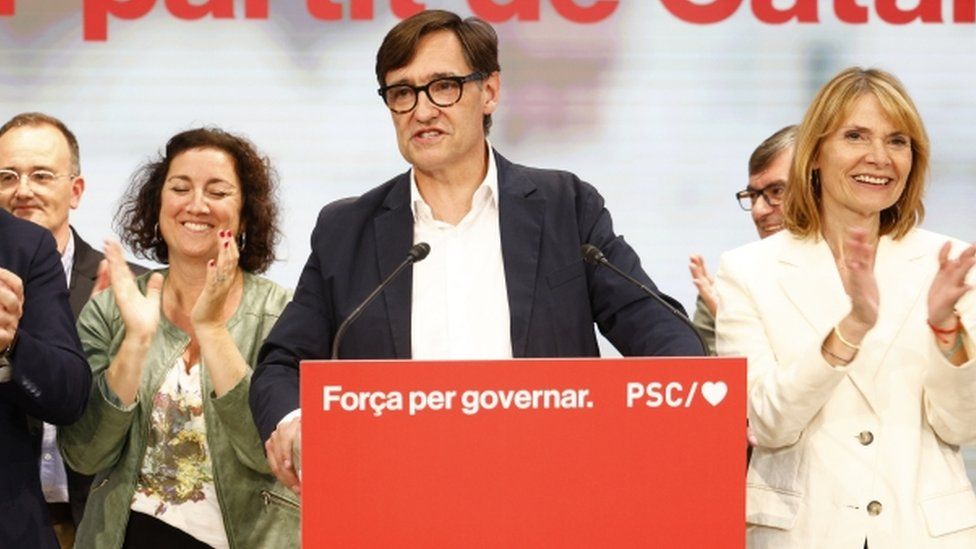Spain Socialists win Catalan vote as separatists lose ground
The Socialist Party led by Spanish Prime Minister Pedro Sánchez has emerged victorious in Catalonia’s regional election, marking a setback for pro-independence parties.
Under the leadership of former Spanish health minister Salvador Illa, the Catalan Socialist Party (PSC) has made significant gains, securing 42 seats with 99% of votes counted.
Support for independence has decreased to 42%, down from 49% in 2017, according to the Catalan government’s statistics institute.
During the campaign leading up to the election, issues such as Catalonia’s drought and housing crisis overshadowed the debate on its relationship with the rest of Spain.
The hardline Together for Catalonia (JxCat) party, led by former regional president Carles Puigdemont, came in second with 35 seats, reclaiming its position as the primary pro-independence force ahead of the Catalan Republican Left (ERC).
However, nationalist parties overall experienced a decline in support, resulting in the loss of control over the regional parliament, a setback for the independence movement.
Despite this, pro-independence parties continue to push for a referendum on independence and have secured significant concessions from the central government in recent years.
The snap election was called by the minority ERC government of Pere Aragonès after failing to garner enough support to pass the region’s annual budget.
Prime Minister Sánchez views this outcome as validation of his policies in Catalonia, particularly the controversial amnesty law aimed at benefiting nationalists facing legal action for separatist activities. The law, which is nearing the end of its passage through the Spanish parliament, has faced strong opposition from the right.
Salvador Illa celebrated the victory as “a new era for Catalonia,” attributing the result to the policies implemented by the Spanish government and Prime Minister Pedro Sánchez.
The amnesty law was a prerequisite for the parliamentary support provided by JxCat and ERC to Prime Minister Sánchez during his investiture, enabling him to form a new central government last November.
Mr Puigdemont, who fled abroad in 2017 after leading a failed secession bid, is expected to benefit from the amnesty and return to Spain. He campaigned ahead of this election from the south of France.
Despite the Socialist win, it will not be easy for Mr Illa to form a government, given that he is likely to need the support of ERC and the far-left Comuns Sumar alliance.
Mr Puigdemont called for ERC not to be part of a coalition that included the unionist PSC. Instead, he suggested the two main pro-independence parties should try to form an administration, as they had done in the past before their relationship broke down.
“If ERC is willing to rebuild bridges, so are we,” Mr Puigdemont said.
However, the fragmented nature of the Catalan parliament, which is split by unionist-separatist allegiances as well as a left-right division, is likely to make post-election negotiations lengthy. If a new administration is not formed, there will be a repeat election.
The conservative People’s Party (PP) made substantial gains to become the fourth party in Catalonia, followed by the far-right Vox. By contrast, the self-styled centrists of Ciudadanos lost their representation in the parliament, just seven years after becoming the region’s primary force.
Meanwhile, a new far-right party, Catalan Alliance, won two seats on the back of its uncompromising platform based on separatism and anti-immigrant policies.

